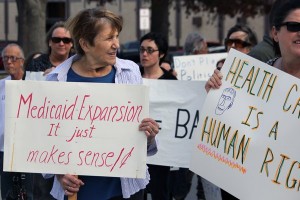OPINION: Missouri legislators should consider Medicaid expansion

By STEVEN H. LIPSTEIN
Republican legislators now hold majorities in both houses of the federal and Missouri legislatures. What will happen with Medicaid reform and expanded eligibility in Missouri?
As a leader of BJC HealthCare, it is certainly true that our hospitals and health professionals who disproportionately serve low-income and uninsured Missourians have a vested interest in the answer to this question. Past Post-Dispatch editorials, recent guest commentaries and several letters to the editor make it clear Medicaid expansion is supported by other members of our community.
THE ACA
The Patient Protection and Affordable Care Act (ACA) allows states to expand Medicaid eligibility for United States citizens living on an annual income at or below 138 percent of the federal poverty limit, which for a family of four is less than $33,000.
Presently, in Missouri, childless adults, no matter how poor, are not eligible for Medicaid. Custodial parents must have a family income below $4,500 a year to qualify.
And the aged, blind or disabled must have individual incomes below $10,000 a year to enroll in Medicaid.
In our state, Medicaid expansion would provide health insurance for hundreds of thousands of Missourians who are childless adults, custodial parents, aged, blind or disabled.
WHAT’S THE COST?
How much would that cost Missourians?
In 2015 and 2016, the incremental cost of expanding Medicaid is paid in full with the federal income taxes Missourians are already going to pay whether or not we expand Medicaid.
Beginning in 2017, up to 5 percent of the costs (approximately $58 million) would become the responsibility of Missouri taxpayers, but importantly most of the cost (95 percent) will still be paid with our federal tax dollars.
The amount borne by Missouri taxpayers will increase annually through 2020, capping at 10 percent annually (approximately $119 million).
THE QUESTION
 So, the question before the Missouri Legislature is whether or not Missouri taxpayers, with both our federal and state income taxes, should pay to expand our state’s Medicaid program for childless adults, custodial parents, the aged, blind or disabled.
So, the question before the Missouri Legislature is whether or not Missouri taxpayers, with both our federal and state income taxes, should pay to expand our state’s Medicaid program for childless adults, custodial parents, the aged, blind or disabled.
Many in our state believe the answer is “yes.” And others in our state believe the answer is “no.”
As the Legislature convenes in 2015, a key question facing the Republican majorities is whether or not anybody is open to changing their minds.
WHAT TO CONSIDER
If minds are “open” to new information, then here are some facts and figures to consider:
- Neighboring states of Arkansas, Iowa, Illinois and Kentucky have expanded their Medicaid programs. Federal tax dollars, a portion of which is paid by Missourians, are paying for this expansion in our border states.
- In states that expanded Medicaid eligibility, the percentage of non-elderly adults who are uninsured decreased by 2.7 percent. In those states that declined Medicaid expansion, the decrease was only 0.8 percent. About 773,000 Missourians remain uninsured.
- The costs of caring for the uninsured in Missouri hospitals are borne by those Missourians (businesses and employees) who are insured; this “cost shift” makes health insurance premiums higher than they would otherwise be if more Missourians had health insurance.
- Missouri families with an annual income of $33,000 paid federal, state and local income taxes; Medicare and Social Security payroll taxes; and property and sales taxes.
Three of four uninsured families have employed heads-of-household, either on a full-time or part-time basis. Many of these hard-working, tax-paying Missourians would become eligible for Medicaid.
Private sector health insurance – even for those who may be eligible for federal subsidies at healthcare.gov – remains unaffordable on household take-home pay under $2,000 a month.
- Some Missouri hospitals, especially those in rural and more remote areas of the state, have begun to struggle, affecting their abilities to serve their communities and employ local citizens.
Legislators in Carroll, Gentry, St. Clair, Lawrence, Audrain, Cooper and Lincoln counties can provide first-hand testimony of these struggles.
Medicaid expansion wouldn’t save all these hospitals, but it would help to preserve vital community services, jobs and, importantly, access to needed medical care.
OPEN MINDS
On behalf of those in our state who live on family incomes below $33,000 (which is approximately equal to the median family income of rural Missouri), and those of us in the medical community who provide needed medical care for these families, we sincerely hope minds are open.
(Steven H. Lipstein is president and CEO of BJC HealthCare in St. Louis. Reprinted from the St. Louis Post-Dispatch, Jan. 14, 2015.)


Leave a Reply